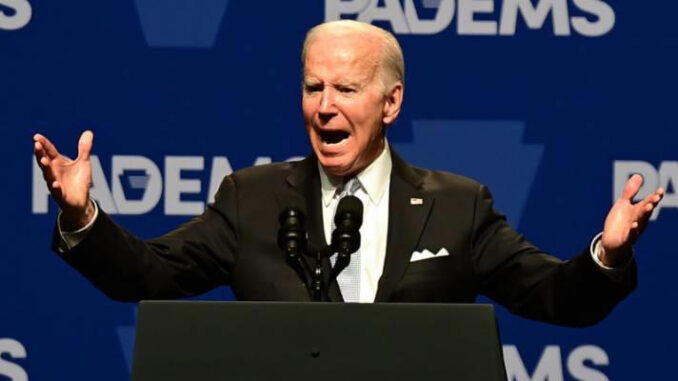
In the wake of scorching inflation and Russia’s war in Ukraine, major gas companies like Chevron and Exxon Mobil are raking in profits. And it’s got President Joe Biden hot under the collar.
In November, days before the midterm elections, Biden launched an attack on the industry, calling their record profits “a windfall of war,” not the result of anything “new or innovative.”
And now, his international energy envoy is calling on oil companies to think of American consumers.
“I think that the idea that financiers would tell companies in the United States not to increase production and to buy back shares and increase dividends when the profits are at all-time highs is outrageous,” Amos Hochstein told the Financial Times. “It is not only un-American, it is so unfair to the American public.”
“You want to pay dividends, pay dividends. You want to pay shareholders, pay shareholders. You want to get bonuses, do that, too. You could do all of that and still invest more. We are asking you to increase production and seize the moment.”
With gas prices still elevated, and many households muddling through an expensive winter, Biden says he’s ready to force these oil companies to act — but while his words for these companies may be strong, he may not have the power to back them up.
Biden doesn’t mince his words
Biden has been waging a battle with oil companies over the last few months, but he escalated it in November when he called on them to “act beyond their narrow self-interest,” to “invest in America by increasing production and refining capacity” on behalf of “their consumers, their community and their country.”
And if they don’t? Biden warns they’re going to face “a higher tax on their excess profits and … higher restrictions.”
The president didn’t elaborate on what those restrictions might be, but promised his administration would work with Congress to evaluate all the available options.
“It’s time for these companies to stop war profiteering, meet their responsibilities in this country and give the American people a break,” Biden added.
Oil companies fire back
While gas has dropped from a record high of over $5/gallon in June, it’s still currently hovering around $3.21. And that, along with a dangerously low oil supply and a dwindling diesel stockpile is clearly weighing on Biden.
But oil companies argue they’re already contributing to the cause. Exxon Mobil’s CEO Darren Woods took a moment during the company’s third-quarter earnings call on Oct. 28 to address Biden. “There has been discussion in the U.S. about our industry returning some of our profits directly to the American people,” Woods said. “That’s exactly what we’re doing in the form of our quarterly dividend.”
The president didn’t take kindly to that, tweeting his response a few hours later: “Can’t believe I have to say this but giving profits to shareholders is not the same as bringing prices down for American families.”
Any taxes would face an uphill battle
Biden appears to be proposing a “windfall” tax to redistribute profits to American consumers still paying out the nose at the pump. But even with Biden’s backing, there’s no guarantee he’ll be able to pass a new corporate tax. For that, he’d need support from Congress and with a Senate divided in half between Republicans and Democrats, that seems unlikely.
He does seem prepared to compromise, though. According to a report in Bloomberg, Energy Secretary Jennifer Granholm addressed oil and gas executives in Washington on Wednesday at a meeting of the National Petroleum Council, an outside federal advisory group with members from Exxon Mobil Corp. and Royal Dutch Shell Plc.
“We are eager to work with you,” Granholm said, adding that fossil fuels are likely to be around for a while.
She also acknowledged the administration has “butted heads” with the industry, referring to it as the “elephant in the room.” And with growing demand and a shortage of diesel in the Northeast, she says the administration is aware fossil fuel production will need to increase soon.
Still, the president isn’t likely to back down entirely. In November, Exxon and Chevron, two of the country’s biggest oil companies, reported hefty profits for the fourth consecutive quarter. That same day, in a briefing from the White House, Biden pointed out that six of the largest companies “made $70 billion in profit” in just 90 days.
Appalled that all that money was going back to their shareholders and executives, Biden issued a promise: “I’m going to keep harping on it. [These companies] talk about me picking on them, they ain’t seen nothing yet. I mean it. It outrages me.”



